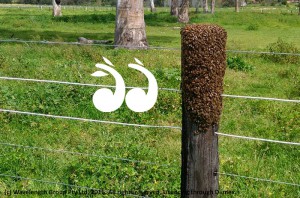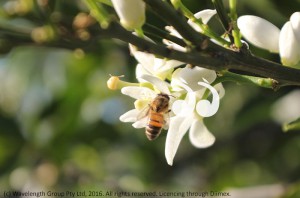Swarming Season Begins
LAST week several species of bees were placed on the endangered list in the United States and in parts of the United Kingdom wild honey bees are nearly extinct.
Fortunately in the Upper Hunter bee numbers are not in dire decline, but Snowy Bragg is encouraging people to call him instead of a pest control company if they find a swarm of bees.
“Swarming season runs from now until about Christmas, once we get some warm days the bees get going,” said Mr Bragg.
“A bee will split off from their colony with a queen and it’s either a new queen or an old queen which has been kicked out and they form another hive,” he said.
“They will settle on a branch or the post of a verandah and the queen will be in the middle of the big ball of bees.
“They will send scouts out to look for a place to have the new hive in the hollow of a tree, or a wall cavity or they may build it out in the open,” he said.
“We can come and collect the swarm and take them back up to Rouchel and hopefully they stay in a new hive with us and away we go,” Snowy Bragg said.
Snowy Bragg said most people don’t understand the importance of bees to agriculture and urges people not to be frightened of bees being in their back yard doing what they are meant to do.
“The human population probably would never have exceeded 3 billion if it weren’t for bees, because we never would have had the crop yields and the food we have without bees pollinating crops for us,” said Snowy Bragg.
“Things like almonds for example, without bees you won’t get a single almond on a tree,” he said.
“In the Riverina and Mildura and places where almonds are grown, they use about 120,000 hives a year in the spring specifically to pollinate the crop and if you don’t do that basically the bank won’t even touch you.
“And there a quite a few crops like that and it’s reached the point where in China they are actually paying people to pollinate crops by hand due to the lack of bees, so bees save us billions in agriculture.
“We do get some interesting calls to report bees in trees and people asking us to take them out of the trees; we can’t really stop bees from being in trees, because they are just doing what they are meant to do, if it is swarm we can move them but not just bees in a tree,” he laughed.
Honey Production:
Snow and his wife Lousia are collecting swarms of bees to assess them for honey production on their property in Rouchel.
“They are a bit like cattle, you can have very productive bees that breed like anything and collect lots of honey, other times you can have bees that breed like anything and make no honey or others that will belt the daylights out of you every time you go near them,” Snowy Bragg said.
“It’s a good at the moment because I think people are becoming more aware of honey in their diets compared to sugar, so demand is outstripping supply and prices are continually rising,” he said.
“It’s an honest living, an interesting industry and a bit more stable than the cattle industry,” Snowy Bragg said.
If you have a swarm of bees you’d like removed phone Snowy Bragg: 0416 264 251.
 scone.com.au
scone.com.au
